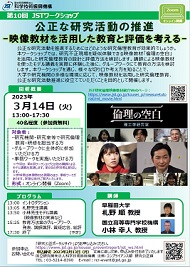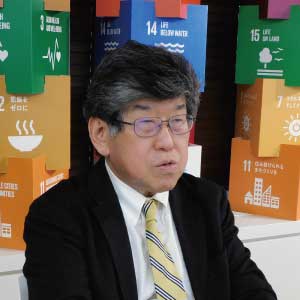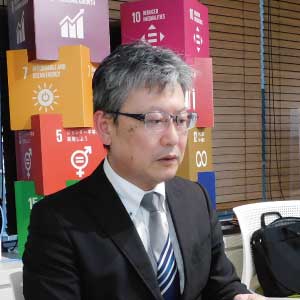Event Reports
The 10th JST Workshop "Promoting Activities toward Research Integrity -Considering Education and Evaluation Utilizing the Instructional Video- "(14 Mar '23)

The 10th JST Workshop "Promoting Activities toward Research Integrity -Considering Education and Evaluation Utilizing the Instructional Video- " was held on 14 March. As with the previous workshop, this workshop aims for participants to examine research ethics education utilizing instructional video materials in order to make use of them in their own institutions. Twenty-five people participated in this event, and by using the instructional video "Gaps in Ethics*" made by JST, engaged in enthusiastic discussions on educational goals and design and evaluation methods for educational activities in each group. Here is an overview of the day's activities.
Lecture
"Considering Effective Ways to Use the Research Ethics Instructional Video" by Professor Jun Fudano, Waseda University

The workshop started with a lecture by Professor Fudano. Professor Fudano explained not only about how to use instructional video materials, but also discussions regarding overseas research ethics education such as Responsible Conduct of Research (RCR) educations by the U.S. Office of Research Integrity (ORI) or the National Institutes of Health (NIH) and, SOPs4RI (Standard Operating Procedure for Research Integrity) supported by the Horizon 2020, and the Research Integrity Promotion Plan (RIPP), which aims to build a good research environment. The participants were given a wide range of topics to broaden their perspectives.
He explained the first goal of the workshop was to understand the purpose and contents of RCR education. In particular, he stated it is important to set learning and educational goals, clarifying how video materials will be used and how what they are intended to achieve will improve the quality of training and education.
He stated that it is important not only to read books and texts, but also to be able to achieve educational goals regarding "values and attitudes" and "abilities and skills".
As a second goal, he explained the importance of being able to propose RCR education tailored to every participant's respective organization when they return. He exemplified that the use of actual cases is not the only method of RCR education, but also using instructional video materials (hypothetical cases). For example, he showed that by using JST's instructional video materials "Gaps in Ethics, the Science and Engineering Research Center Edition", it is possible to set learning and educational goals, regarding "abilities and skills" and "knowledge and understanding", and to ask questions about research ethics while viewing specific scenarios.
Model lecture
Professor Yukito Kobayashi, National Institute of Technology, "Analyze the Causes of Ethical Issues and Consider Countermeasures"

After the group members introduced themselves and the atmosphere became slightly more relaxed, Professor Kobayashi gave a model lecture.
At the beginning, he explained what he wanted participants to consider in this workshop. Why does misconduct occur even though it is considered wrong? He said it is important to analyze the causes and consider countermeasures. In this workshop, he asked participants to analyze why the characters in the video could not act although they should have. For instance, in the instructional video "Gaps in Ethics", what should have been done by Associate Professor Segawa? The participants were asked during the group work to focus not only on the actions that "should have been done", but also on why they could not do them. Instead of just acting as a critic, he said that he wanted everyone to analyze the reasons that they could not act.
After their group work, the design and practice of research ethics education was explained to the participants in the second half of the model lecture. When setting up training, he remarked that not only is education on individual qualities such as "knowledge and understanding", "abilities and skills", and "values and attitudes" necessary, but also that organizational and environmental improvements surrounding research, such as establishing research and educational institutions, are also important factors for promoting high-quality research activities. He emphasized that while knowledge is important, it is not enough to have the appropriate knowledge, it is also important to have the "ability and skill" to make decisions.
In designing research ethics education, he explained that it is necessary to clarify what can be gained by studying research ethics--in other words, the learning objectives. He emphasized the importance of setting an image of what kind of human resources you are trying to develop, and to think about what kind of training you can provide to achieve that image.
Group Work
In the latter half of the workshop, participants joined a group work activity to actually create a lecture program using the instructional video "Gaps in Ethics, the Science and Engineering Research Center Edition". Although it was a condensed 60-minute session, it was impressive to see how each participant expressed his or her thoughts firmly while respecting and complementing each other's opinions, and consolidated their opinions while discovering commonalities. With reference to the lectures by Professor Fudano and Professor Kobayashi, the participants brushed up on what they had studied in advance and designed a more specific lecture program through group work.● Overall Review
Professor Fudano commented that, "Thinking and discussing together in a group is better than doing so alone; you can come up with various ideas, create better things, and see what you couldn't on your own. I would like you to increase the number of people who you discuss with in the organization you belong to". In addition, he said, "An important part of research ethics education is to help you learn what are responsible research activities. The RCR education that I thought about today is an important part of nurturing researchers, and I hope that you will work with the spirit that plays a fundamental role in it".Professor Kobayashi commented that, "Knowledge is important, but it is not the end all be all. If too much is crammed into a lecture, the entire lecture will be blurred, so the lecture should be designed with clear positioning. I will present what I hope you to consider as your goals in this lecture. In order to do so, it is necessary to think specifically. If you think about how we want researchers and educators to grow and organize that by importance for these lectures, it will make those goals clearer. When goals and learning activities are integrated, results can be visualized". He reiterated the importance of clarifying the learning and educational goals and objectives that were in the model lecture. The 4.5 hour workshop was concluded with feedback from the two professors.

-
We received the following comments from the participants in the questionnaire.
- I would like to use this opportunity not only to prevent misconduct, but also to create an environment in which people can "act" when they learn about the kind of environment where appropriate research should be conducted and the factors that cause misconduct.
- The examples of ethics education are clear and easy to implement effectively at each facility.
- I think it is necessary to listen to different opinions and ideas in order to use the material effectively.
JST will continue to produce educational materials that will be useful for universities and research institutions involved in research ethics education, and will hold various workshops on how to use the instructional video "Gaps in Ethics". If these topics interest you, please feel free to join jst workshops.
Report on the 9th Workshop

